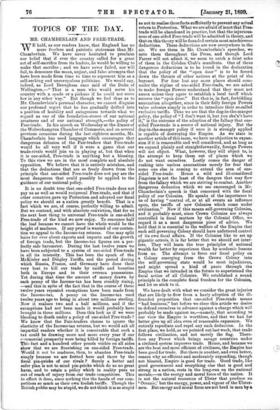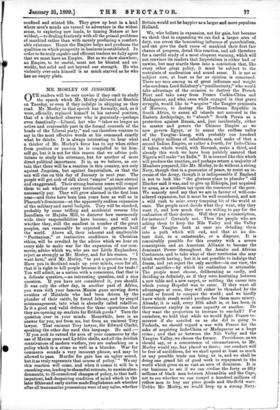TOPICS OF THE DAY.
MR. CHAMBERLAIN AND FREE-TRADE.
WE hold, as our readers know, that England has no more fearless and patriotic statesman than Mr. Chamberlain. We have never hesitated to proclaim our belief that if ever the country called for a great act of self-sacrifice from its leaders, he would be willing to make that sacrifice ; and we have never failed, nor will fail, to denounce the mean, unjust, and false attempts that have been made from time to time to represent him as a self-seeking and unscrupulous politician. We would say, indeed, as Lord Brougham once said of the Duke of Wellington,—" That is a, man who would serve his country with a spade or a pickaxe if he could not serve her in any other way." But though we feel thus as to Mr. Chamberlain's personal character, we cannot disguise our profound regret that he has gradually drifted into a position of hostility and antagonism towards what we regard as one of the foundation-stones of our national greatness and of our national strength,—the policy of Free-trade. In his speech on Wednesday at the dinner of the Wolverhampton Chamber of Commerce, and on several previous occasions during the last eighteen months, Mr. Chamberlain has used language which encourages that dangerous delusion of the Fair-traders that Free-trade would be all very well if it were a game that our trade-rivals would join us in playing at, but that when it is one-sided, Free-trade is anything but a blessing. To this view we are in the most complete and absolute opposition. We believe that it is entirely mistaken, and that the deductions that are so freely drawn from the principle that one-sided Free-trade does not pay are the most dangerous that could possibly be applied to the guidance of our national policy.
It is no doubt true that one-sided Free-trade does not pay us as well as would reciprocal Free-trade, and that if other countries gave up Protection and adopted our fiscal policy we should as a nation greatly benefit. That is a fact which we are, of course, perfectly willing to admit. But we contend, and with absolute conviction, that for us the next best thing to universal Free-trade is one-sided Free-trade of the kind we now enjoy. To renounce half the loaf because we cannot have the whole would be the height of madness. If any proof ie wanted of our conten- tion we appeal to the Income-tax returns. One may split hairs for ever about exports and imports and the growth of foreign trade, but the Income-tax figures are a per- fectly safe barometer. During the last twelve years we have been subjected to a system of one-sided Free-trade in all its intensity. This has been the epoch of the McKinley and Dingley Tariffs, and the period during which Russia, France, and Germany have done their very best to kill our trade by tariffs and bounties both in Europe and in their oversea possessions. Yet during that time the amount of money drawn by each penny of the Income-tax has been steadily rising, —and this in spite of the fact that in the course of these twelve years repeated exemptions have been made from the Income-tax, A penny on the Income-tax used twelve years ago to bring in about two millions sterling. Now it realises two and a half millions, and if the exemptions had not been made it would probably have brought in three millions. Does this look as if we were bleeding to death under a policy of one-sided Free-trade ? We know that the Fair-traders choose to ignore the elasticity of the Income-tax returns, but we would ask all impartial readers whether it is conceivable that such a tax could be drawing more and more every year if our commercial prosperity were being killed by foreign tariffs. This fact and a hundred other proofs visible on all sides show that we are flourishing on one-sided Free-trade. Would it not be madness, then, to abandon Free-trade simply because we are fretted here and there by the fiscal pin-pricks of our rivals ? Surely a better and safer plan is not to mind pin-pricks which do us no great harm, and to retain a policy which in reality puts us out of reach of injury from our trade competitors. This in effect it does, since nothing ties the hands of our com- petitors so much as their own foolish tariffs. Though the British public may be stupid, we do not think it is so stupid as not to realise these facts sufficiently to prevent any actual return to Protection. What we are afraid of is not that Free- trade will be abandoned in practice, but that the injurious- ness of one-sided Free-trade will be admitted in theory, and that on this theory will be founded certain most mischievous deductions. These deductions are now everywhere in the air. We see them in Mr. Chamberlain's speeches, we note them throughout the Press, and though Lord Farrer will not admit it, we seem to catch a faint echo of them in the Cobden Club's manifesto. One of these dangerous deductions is to be found in the declaration that the policy of the "open door" is to be forced down the throats of other nations at the point of the bayonet. For fear lest any more places should come under the regime of one-sided Free-trade, we are asked to make foreign Powers understand that they must not annex unless they agree to establish a local tariff which secures the " open door." But that is, in fact, forbidding annexation altogether, since in their folly foreign Powers value colonies simply in order to introduce their so-called exclusive tariffs. Thus we see that the dog-in-the-manger policy, the policy of "I don't want it, but you sha'n't have it," is the outcome of the adoption of the fallacy that one- sided Free-trade is a source of national injury. But the dog-in-the-manger policy if once it is strongly applied is capable of destroying the Empire. As we state in another article of this issue, we have no objection to expan- sion if it is reasonable and well considered, and as long as we expand plainly and straightforwardly, foreign Powers will not object. What, however, they will object to, is the attempt to keep them out of places which we do not want ourselves. Lastly comes the danger of rushing into useless annexations merely for fear that some one else is coming to extend the area of one- sided Free-trade. Hence a wild and ill-considered Jingoism is not the least of the dangers that may flow from the fallacy which we are striving to combat. Another dangerous deduction which we see encouraged in Mr. Chamberlain's speech is that concerned with the fiscal policy of our Colonies. He speaks of the importance to us of having " control of, or at all events an influence upon, the tariffs of new Colonies which come under civilisation." Now if this means self-governing Colonies, and it probably must, since Crown Colonies are always controlled in fiscal matters by the Colonial Office, we regard it as a most dangerous piece of advice. We hold that it is essential to the welfare of the Empire that each self-governing Colony should have unfettered control of its own fiscal affairs. If the Colonies like to set up gigantic octrois, it is far better that we should not inter- fere. They will learn the true principles of national wealth far better by experience than by academic lessons from us. The attempt to force our fiscal policy on a Colony emerging from the Crown Colony into the self-governing state would be most injudicious, and might spread a kind of panic through the Empire that we intended in the future to superintend the fiscal action of all Colonies. We established a sound principle in the complete fiscal freedom for the Colonies, and let us stick to it.
We have dealt with what we consider the great injuries that are likely to flow from a hasty adoption of the ill- founded proposition that one-sided Free-trade means " bad business," but before we close this article we desire to defend ourselves in advance against a charge which will probably be made against us,—namely, that according to our view the Empire is worthless, and that we had far better give up all idea even of reasonable expansion. We entirely repudiate and repel any such deduction. In the first place, we hold, as we pointed out last week, that trade follows civilisation, and not merely the flag. There- fore any Power which brings savage countries under a, civilised system improves trade. Hence, and because we are the best and most efficient of civilisers, the Empire has been good for trade. But there is another, and even better, reason why an efficient and moderately expanding, though not bloated, Empire is good for trade. Good trade, like good government and everything else that is good and strong in a nation, rests in the long-run on the national morale,—on the energy and moral force of the nation. It is not the natural resources of Ulster that produce an Oceanic,' but the energy, power, and vigour of the Ulster- men. But energy and moral force are not bred in men by a confined and stinted life. They grow up best in a land where men's minds are turned to adventure in the widest sense, to exploring new lands, to taming Nature at her wildest,—to dealing fearlessly with all the primal problems of mankind rather than with merely producing a comfort- able existence. Hence the Empire helps and produces the qualities on which prosperity in business is established. In order to be truly capable and efficient traders we fully agree that we must have an Empire. But as we show elsewhere, an Empire, to be useful, must not be bloated and un- wieldy, but solid and not beyond our strength. He who violently over-eats himself is as much starved as he who has an empty plate.



































 Previous page
Previous page